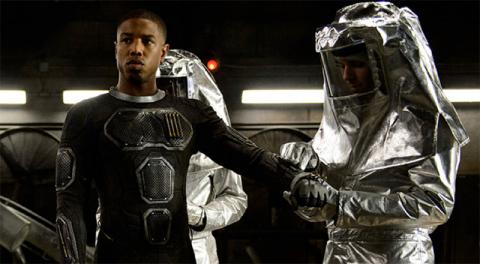Advice for Berklee Students from Alumni in the Film Industry

Shie Rozow ’97 worked as music editor on the Marvel film "Avengers: Age of Ultron."

Another Marvel film, "Fantastic Four," features work by supervising music editor Curt Sobel '78.

Jay Jennings '92 worked on sound design for "Terminator: Genisys," the latest installment in the popular sci-fi series.

Erica Weis played both music supervisor and music editor roles on the film "Spy," starring Melissa McCarthy.

Joe Kraemer '93 composed the music for "Mission: Impossible - Rogue Nation," starring Tom Cruise.
Berklee alumni working on music and sound for some of this summer’s biggest blockbuster films recently reflected on their time at Berklee and shared tips for students interested in working in the industry.
Read more about alumni working on summer 2015 blockbusters here.
Joe Kraemer ’93 (composer, Mission: Impossible – Rogue Nation)
“There are so many skills I learned at Berklee that I use every day. The first might be the notion that being a musician is a 24-hour-a-day existence. I am always thinking about music somewhere in my head. It was my time at Berklee that allowed me to develop that.”
“Ear training skills are invaluable for me, since I often come up with themes for projects I’m working on when I’m away from a keyboard; the skills I was introduced to by Mitch Haupers in Ear Training 101 still serve me well today when I’m walking around the streets of London, riffing on the theme to Mission: Impossible in my mind and finding new variations. Thanks to Berklee, I can remember the notes and melodies, and dedicate them to memory until I can get to a keyboard and some staff paper and write them down. The Film Music [now Film Scoring] Department gave me such a great toolbox of skills—things I could not survive without today, such as orchestration, conducting, calculating beat-sync and timing issues, and using sequencers to compose music.”
“I think one gets as much out of Berklee as they put into it. There are so many hidden sources of knowledge there, from the music books and tape archives in the library to the things you can learn from other students. It’s not a school to go to class and then play video games in the dorm and drink all weekend. You can get so much out of it if you capitalize on the time there. I learned more in the four years I spent at Berklee than I did in any other four-year block of my life.”
Jay Jennings ’92 (sound design, Terminator: Genisys)
“To the aspiring Berklee student I would say this: follow your passions! Although I entered the college with a focus on performance, I left with a degree [having studied] music production and engineering and an unrelenting drive to get to Hollywood and be the best sound designer in town. Even though I arrived at school with a future of professional drumming in mind, the varied curriculum at Berklee made it possible for me to realize the interest and potential I had in the studio side of the music business. And over 50 films and multiple awards later, I’ve never looked back.”
Curt Sobel ’78 (supervising music editor, Fantastic Four)
“Attending Berklee made me confident about my skills and myself. I came here with a Midwestern attitude and an East Coast education so conquering L.A. was something I was prepared for. I will always be indebted to the people and environment I experienced at Berklee. Just last week I met with two budding songwriters, presently juniors at Berklee, who plan on moving out here after they graduate. Helping others by answering questions and guiding prospective up-and-comers as best I can on the ins and outs of surviving this massive place is a way I give back to the school.”
“If you like vacations, the film industry is not for you. I’d like a vacation but might be moving on to another project immediately following this film. This is a very difficult industry to say ‘no’ in, but I can’t think of anything else I’d rather be doing.”
Erica Weis ’00 (music supervisor/music editor, Spy)
“The summer before my last year at Berklee, I was chosen by the Berklee film scoring faculty and Dan Carlin (then head of Segue Music) for a music editing internship in Los Angeles. The experience was priceless and eye-opening for me. After graduation from Berklee, I was able to take what I learned during my internship at Segue and immediately apply it to my early music editing career.”
“Take classes in anything that may possibly interest you—try everything out and then really focus on what you love and what you are good at. During my days at Berklee, I took classes in everything. My first glimpses into what was, at the time, a new world for me were through the experiences of Richard Davis, Jon Klein, and Eric Reasoner; their words were my guiding path until I was able to create my own. I often look back at my Berklee days and think about how the classes I took served as building blocks for my future path in the film music industry.”
Shie Rozow ’97 (music editor, Avengers: Age of Ultron)
“If you want to be a composer, compose every single day. It’s no different than practicing an instrument. Get your friends to play what you wrote, and learn from it. If you want to be a music editor, edit music every single day. It’s easier than ever to get video content today; just mute the sound and cut some music against it, then do it again three or four more times, each time giving the scene a different yet valid feel through the music choices you make. Then pick another video and do it again. If you’re into music business, start a music business in school.”
“The ‘real world’ isn’t nearly as forgiving, so Berklee is a great place to fall flat on your face with no real consequences. And when you get out, remember: the world doesn’t owe you anything. You need to earn it. In my experience, the best way to do so is to find a need and fulfill it. Don’t look for a job that’s what you think you want and will get you to the next step. Look for a job where you think you can be most useful and it will almost always lead you forward.”
